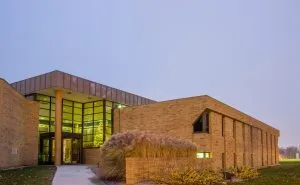Valparaiso University Students Help Seniors Combat Isolation and Depression

The COVID-19 pandemic has presented everyone with new dangers and challenges, but for one particularly vulnerable group in the community, those challenges can be hard to observe and even harder to confront.
“The last several years have been isolated. It’s a particular concern for our elderly who live alone,” Amy Buckenmeyer, Ph.D., MPH, RN, CPH, public health program director and associate professor, says. “We know that particular individuals do not typically engage in as many healthful behaviors when they are advancing in age and are alone as they do when they have a companion.”
To help identify and address these growing issues in the local senior citizen community, 18 Valparaiso University College of Nursing and Health Professions students in the Public Health Nursing course worked in partnership with Porter-Starke Services’ Healthy IDEAS program and Meals on Wheels of Valparaiso to meet, connect with, and ultimately work with local seniors to identify and address potential mental health problems.
“It turned out to be a wonderful experience. It was better than any of us had imagined,” Cheryl Slack, DNP, RN, CNE, assistant professor of nursing and Public Health Nursing course instructor, says.
Students received several hours of training from Porter-Starke Services at the start of the semester in how to administer the screenings, evaluate mental health and wellness, and work with clients to improve their well-being. In-depth role playing exercises strove to prepare students for the situations they might have encountered out in the field.
“I was kind of panicking at the end of training. I did not feel qualified to do this,” Morgan Herron ’22 says. “But my first visit went really well. I was able to ask the questions and build trust with my client. I think you don’t know what you’re qualified to do until you’re actually doing it.”
Students spent their 8 a.m. class calling clients from Meals on Wheels of Porter County and Meals on Wheels of Northwest Indiana and asking if they would be willing to undergo free screening at their homes later in the day.
“Depression in older adults is often considered a normal part of aging, and that’s not true,” Dakota Kampmeier ’22 says. “Because these seniors believe it’s a normal part of aging, they do not consider it fixable, which it is. By identifying individuals with depression we can help to break that stigma and introduce programs and services that help. We let people know that help is available.”
If a screening indicated there could be a mental wellness concern, further steps could be taken. Students primarily tried to work with seniors to find hobbies and activities that could help keep them active and engaged. Rather than relying on a clinical professional for constant assistance, this process — referred to as behavioral activation — gives seniors the tools they need to put their mental well-being in their own hands.
“One client really liked to make jewelry, but she hadn’t been doing it anymore because she had been hospitalized and there was so much else going on,” Morgan says. “We gave her a three-step plan to get to where she could be making jewelry again.”
Professor Buckenmeyer hopes that performing these home health screenings will give the students a broader picture of what health care can be.
“It helps them understand that public health and health care extends into the community setting, and into people’s homes, not just hospitals and clinics,” Professor Buckenmeyer says. “It helps them to realize that where we live, work, and play affects our health more so than our genetic code.”
For students, the experience has driven home the importance of their education and how they can impact the community around them.
“It’s very easy to look introspectively and think ‘this is my nursing education, this is what I’m doing in my class with my time’,” Dakota says. “But getting out into the community makes it much less about me.”
Morgan relates how the experience has helped the development of professional skills that she will take with her after graduation.
“It may sound simple, but this experience really prepared me to be more comfortable sitting down, talking to someone, and understanding their life and what they’re going through,” Morgan says. “Assessing how someone is feeling, unlike physical assessments that you can see, is one of the hardest things. This class really prepared me to use appropriate and empathetic language with clients.”
“It was an excellent clinical experience in terms of an opportunity to interact with the senior population,” Professor Slack says. “My favorite part was seeing the change and transformation in the students with their success.”
All students in the Public Health Nursing course pursue clinical experiences that fall under the public health umbrella. Previous projects have included working in correctional nursing in the prison systems and working on community assessments for determinants of health. Professor Slack says the class is already set to repeat the screening and assistance of senior citizens with Porter-Starke Services over the summer semester.
Public Health Nursing is just one of the many ways that the College of Nursing and Health Professions prepares their students to thrive in the health care field and to make a difference in their community. To learn more about the opportunities that the college offers, visit valpo.edu/conhp.
